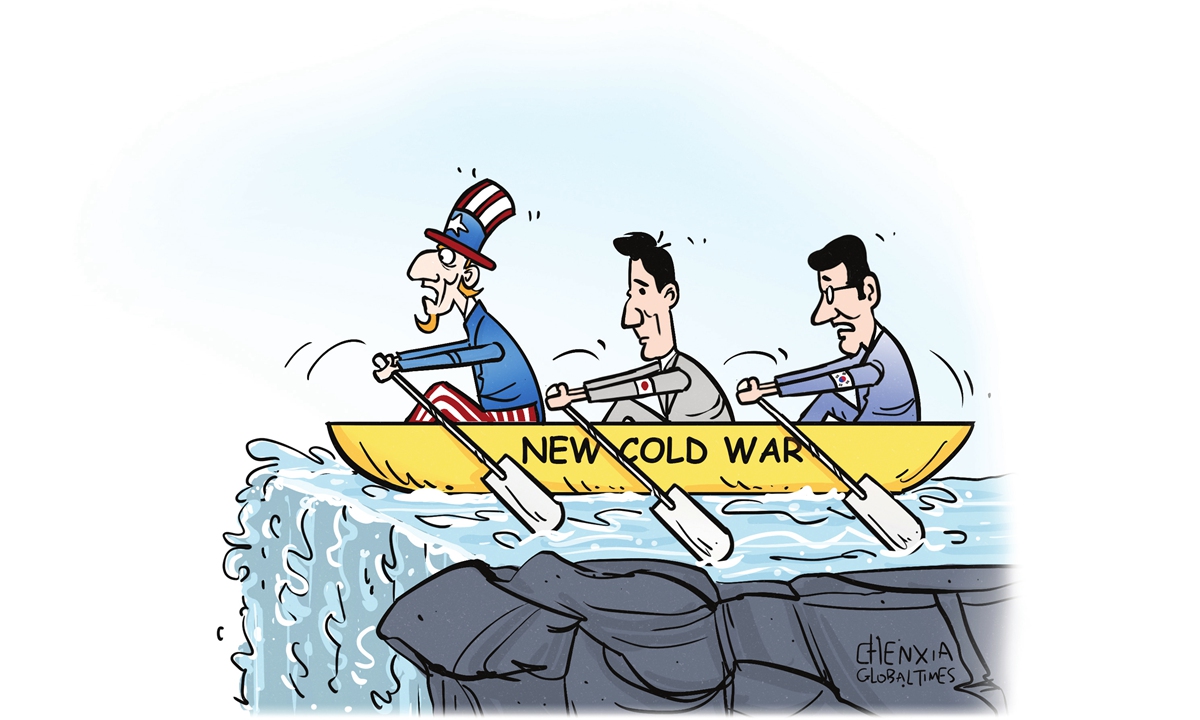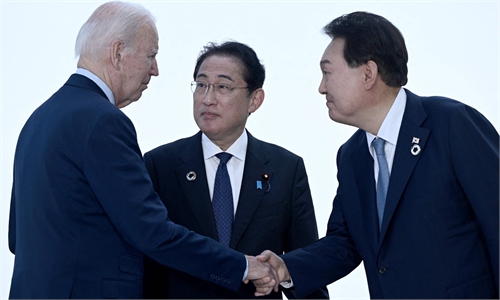Japan and S.Korea stand guard for US at huge potential cost: Global Times editorial

Illustration: Chen Xia/GT
On August 18 local time, the Camp David summit between the US, Japan and South Korea began. Reportedly, the three leaders plan to have bilateral and trilateral talks respectively and hold a joint press conference later in the day. Moreover, the summit, which lasts less than a day, is expected to adopt two outcome documents concerning "Camp David Principles" and "Spirit of Camp David," of which the former will be published with a higher profile than "joint statement" and will become the general policy guiding the trilateral cooperation. However, they are still discussing "how and how much we describe China" in the trilateral documents, according to Japan's Ministry of Foreign Affairs on Thursday.
Although the US has high expectations for the summit, describing it as creating the "trilateral relationship for the 21st century," the differences between the parties can't be hidden when the topics go from pleasantries to details. The US certainly wants to tie Japan and South Korea to a rope that forms the hinge for China in the diplomatic, military and economic fields. Nevertheless, one of the challenges Biden faced is how to convince Japan and South Korea that the US' policies "are also in the shared interests of Seoul and Tokyo," according to the Washington Post. This artistic take actually means "How can the US fool Japan and South Korea so as to make them willingly give up their own national interests and stand guard for the US in the frontier of the 'new cold war.'"
This account is not difficult to calculate at all. If the trilateral structure of the US, Japan and South Korea is created in full accordance with the will of the US, the prospects it brings to the Asia-Pacific region are easily foreseeable. First, the trilateral security cooperation directly targets North Korea, which is equivalent to turning the Korean Peninsula into a pressure cooker, and South Korea will bear the brunt of the security pressure. Decades of experience have proved that the so-called "extended deterrence" of the US has never been able to bring real security to South Korea. Secondly, the US' efforts to strengthen the security of the three sides in science and technology, no matter how they try to whitewash it, will probably destroy the hard-won economic and trade ecological environment in Northeast Asia. According to Washington's blueprint, the first to suffer will be the Japanese and South Korean enterprises, while the economic prosperity of the Asia-Pacific region will be torn into an open wound, and may even infect a wider area.
For Japan and South Korea, it is not that the current policymakers do not see these consequences, and they know very well that this behavior is bound to alert regional countries such as China, which will not sit idly by and watch actions that jeopardize their own interests. Therefore, there is a clear difference in the attitudes of the three countries on how China should be mentioned at the summit.
On the day before the summit took place, an official of the South Korean presidential office said that the focus of this meeting is not to contain China, and they do not believe that the three parties will discuss the controversial investment restrictions against China, according to Yonhap News Agency. This is because the Blue House is well aware that this does not align with the national interests of South Korea.
What we want to reiterate is that Tokyo and Seoul must not harbor any wishful thinking on this issue. There is no "perfect balance" here that would allow them to tightly bind themselves to the US in terms of politics and security, while also benefiting from Asia-Pacific prosperity in terms of economy and social development. All in all, the current decision-makers in Japan and South Korea are too short-sighted and selfish; if they are only focused on their present "diplomatic achievements with the US" without considering that their decisions today could impact generations in Japan and South Korea, the development trajectory of both nations will be influenced for decades to come. Whether it's for their own future generations or for the prosperity and stability of the Asia-Pacific region, they bear a historical responsibility.
On Wednesday, the South Korean presidential office disclosed the achievements expected from the Camp David summit, stating that this day "will go down as a watershed moment in the history of cooperation between our three countries." This statement was likely intended for the domestic audience in South Korea who had questioned the summit. What concerns us is that the "Camp David summit" might indeed become a watershed for the situation in Northeast Asia, but not in the way South Korea portrays it. Instead, it might mark a shift away from the past when East Asia worked together to overcome differences and controversies for peace and development, toward a direction of amplifying divisions and disputes, leading to factionalization and confrontation. An earlier editorial by the Global Times pointed out that the "Camp David summit" will sound the trumpet for the march toward a "new cold war," and this concern has grown stronger now that the summit is being held.
US Ambassador to Japan, Rahm Emanuel, acknowledged, "This [Camp David summit] is a major move on the chessboard that just doesn't kind of come and go," indicating that the US is making a significant strategic move. With whom does the US envision playing this chess game? And who might be viewed as pawns by the US? Some things don't need to be explicitly stated; they are understood by all.
The proactive "major move" taken by the US carries enormous risks for all the parties involuntarily drawn into it. The lesson from Europe's security predicament leading to the Russia-Ukraine conflict stands as a stark warning. The destination hinted at by the "Camp David summit" is, in reality, a pitfall that the East Asian region should vigorously strive to avoid. The leaders of Japan and South Korea, who eagerly attend the summit today, will sooner or later experience the consequences of stepping into this pitfall.

